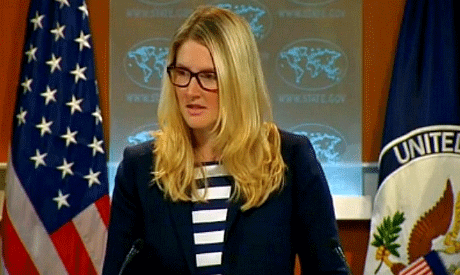 The US expressed alarm on Monday over Egypt's recent declaration of the Muslim Brotherhood a terrorist group as well as the ongoing detentions of "peaceful" protesters and activists, moves it says will hinder Egypt's transition to democracy.
The US expressed alarm on Monday over Egypt's recent declaration of the Muslim Brotherhood a terrorist group as well as the ongoing detentions of "peaceful" protesters and activists, moves it says will hinder Egypt's transition to democracy.
A State Department official said Washington was "concerned" that the movement – which propelled Islamist president Mohamed Morsi to power last year, but has been battered by a sustained crackdown since he was deposed in July – was last week designated as terrorist.
Deputy Spokesperson Marie Harf also voiced anxiety about the ongoing detentions by authorities, which encompass "peaceful demonstrators, civil society, and political activists."
Hundreds of the Brotherhood's loyalists have been killed by security forces in recent months and thousands others, including the group's upper echelons, have been arrested.
A protest law passed in November, which rights groups criticised as "repressive," has also allowed authorities to detain several non-Islamist activists.
"We remain deeply concerned about all of the politically motivated arrests, detentions, and charges in Egypt," Harf said in a Monday press briefing.
She added that such actions "raise questions about the rule of law being applied impartially and equitably, and do not move Egypt’s transition forward."
The Brotherhood was declared a terrorist organisation last week after 16 people were killed in the suicide bombing of a police headquarters north of Cairo, an attack which they condemned and for which a militant Sinai-based group claimed responsibility.
A US official said last week the administration of President Barack Obama was not considering, or even discussing, the possibility of the US government designating the Brotherhood a terrorist organisation.
The spokesperson noted that US Secretary of State John Kerry reiterated similar concerns during his last phone call with Foreign Minister Nabil Fahmy a day after Egypt declared the Brotherhood a terrorist group.
Harf added that the country's military leaders carry the responsibility to move Egypt's democratic transition forward and to create a politically inclusive climate for all parties.
"There are responsibilities on other sides as well to protest peacefully," she clarified.
Speaking of a referendum on Egypt's constitution expected mid-January, the US official said it was up to the Egyptian people "to decide how to move this forward."
The vote will mark the first milestone of a transitional roadmap adopted after the army ousted Morsi in July following massive protests nationwide against his troubled year in power.
The referendum will be followed by parliamentary and presidential polls, with Egyptian officials saying the state is more likely to call a presidential vote first, tweaking an original timetable in which parliamentary elections preceded.



